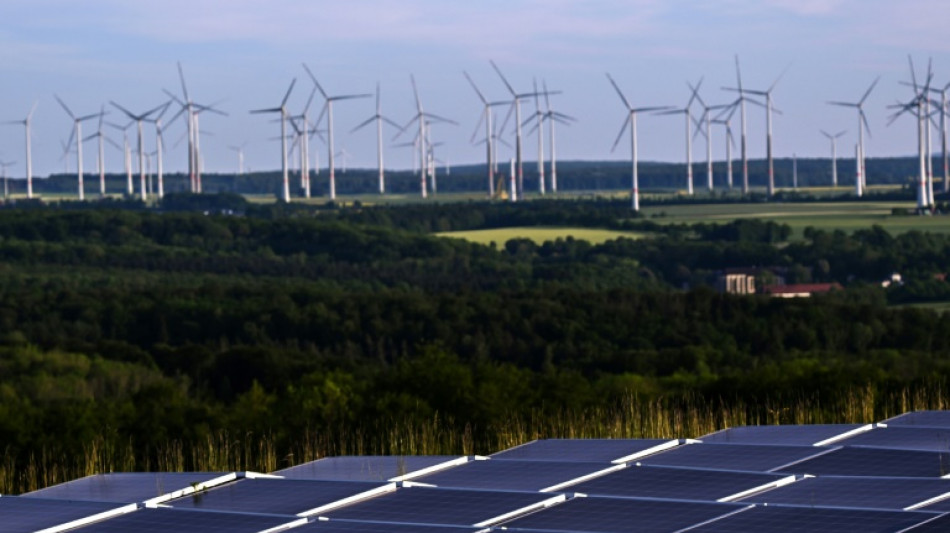
-
 Breyten Breytenbach, writer who challenged apartheid, dies at 85
Breyten Breytenbach, writer who challenged apartheid, dies at 85
-
Tuipulotu try helps Scotland end Australia's bid for Grand Slam

-
 Truce called after 82 killed in Pakistan sectarian clashes
Truce called after 82 killed in Pakistan sectarian clashes
-
Salah wants Liverpool to pile on misery for Man City after sinking Saints

-
 Berrettini takes Italy to brink of Davis Cup defence
Berrettini takes Italy to brink of Davis Cup defence
-
Lille condemn Sampaoli to defeat on Rennes debut

-
 Basel backs splashing the bucks to host Eurovision
Basel backs splashing the bucks to host Eurovision
-
Leicester sack manager Steve Cooper

-
 IPL auction records tumble as Pant, Iyer break $3 mn mark
IPL auction records tumble as Pant, Iyer break $3 mn mark
-
Salah sends Liverpool eight points clear after Southampton scare

-
 Key Trump pick calls for end to escalation in Ukraine
Key Trump pick calls for end to escalation in Ukraine
-
Tuipulotu try helps Scotland end Australia's bid for a Grand Slam

-
 Davis Cup organisers hit back at critics of Nadal retirement ceremony
Davis Cup organisers hit back at critics of Nadal retirement ceremony
-
Noel in a 'league of his own' as he wins Gurgl slalom

-
 A dip or deeper decline? Guardiola seeks response to Man City slump
A dip or deeper decline? Guardiola seeks response to Man City slump
-
Germany goes nuts for viral pistachio chocolate

-
 EU urges immediate halt to Israel-Hezbollah war
EU urges immediate halt to Israel-Hezbollah war
-
Far right targets breakthrough in Romania presidential vote

-
 Basel votes to stump up bucks to host Eurovision
Basel votes to stump up bucks to host Eurovision
-
Ukraine shows fragments of new Russian missile after 'Oreshnik' strike

-
 IPL auction records tumble as Pant and Iyer snapped up
IPL auction records tumble as Pant and Iyer snapped up
-
Six face trial in Paris for blackmailing Paul Pogba

-
 Olympic champion An wins China crown in style
Olympic champion An wins China crown in style
-
It's party time for Las Vegas victor Russell on 'dream weekend'

-
 Former Masters champion Reed seals dominant Hong Kong Open win
Former Masters champion Reed seals dominant Hong Kong Open win
-
Norris applauds 'deserved' champion Verstappen

-
 Jaiswal and Kohli slam centuries as Australia stare at defeat
Jaiswal and Kohli slam centuries as Australia stare at defeat
-
Kohli blasts century as India declare against Australia

-
 Verstappen 'never thought' he'd win four world titles
Verstappen 'never thought' he'd win four world titles
-
Former Masters champion Reed wins Hong Kong Open

-
 Awesome foursomes: Formula One's exclusive club of four-time world champions
Awesome foursomes: Formula One's exclusive club of four-time world champions
-
Smylie beats 'idol' Cameron Smith to win Australian PGA Championship

-
 Five key races in Max Verstappen's 2024 title season
Five key races in Max Verstappen's 2024 title season
-
Max Verstappen: Young, gifted and single-minded four-time F1 champion

-
 'Star is born': From homeless to Test hero for India's Jaiswal
'Star is born': From homeless to Test hero for India's Jaiswal
-
Verstappen wins fourth consecutive Formula One world title

-
 Survivors, sniffing dogs join anti-mine march at Cambodia's Angkor Wat
Survivors, sniffing dogs join anti-mine march at Cambodia's Angkor Wat
-
Far right eye breakthrough in Romania presidential vote

-
 Jaiswal slams majestic 161 but Australia fight back in Perth
Jaiswal slams majestic 161 but Australia fight back in Perth
-
Edinburgh's alternative tour guides show 'more real' side of city

-
 IPL teams set to splash the cash at 'mega-auction' in Saudi Arabia
IPL teams set to splash the cash at 'mega-auction' in Saudi Arabia
-
Olympics in India a 'dream' facing many hurdles

-
 Wounded Bangladesh protesters receive robotic helping hand
Wounded Bangladesh protesters receive robotic helping hand
-
Majestic Jaiswal 141 not out as India pile pain on Australia

-
 Giannis, Lillard lead Bucks over Hornets as Spurs beat Warriors
Giannis, Lillard lead Bucks over Hornets as Spurs beat Warriors
-
Juan Mata agent slammed as 'cowardly' by angry A-League coach

-
 Marta inspires Orlando Pride to NWSL title
Marta inspires Orlando Pride to NWSL title
-
Palestinian pottery sees revival in war-ravaged Gaza

-
 Main points of the $300 billion climate deal
Main points of the $300 billion climate deal
-
Robertson wants policy change for overseas-based All Blacks


Renewables overproduction turns electricity prices negative
With the proliferation of solar panels and wind turbines an unusual phenomenon is becoming more and more frequent: wholesale electricity prices turn negative.
While that may brighten the mood of consumers whose power bills have surged in recent years, it could undermine the further development of renewables, a key element in the fight against global warming.
The increasingly frequent phenomenon is "extremely problematic" for the wind and solar sector, said Mattias Vandenbulcke, strategy director of the renewables industry group France Renouvelables.
"It allows some to have harmful, even dangerous rhetoric which says 'renewables are useless'," Vandenbulcke said.
In southern Australia, wholesale electricity prices have been negative some 20 percent of the time since last year, according to the International Energy Agency.
The share of negatively priced hours in southern California was above 20 percent in the first half of the year, more than triple from the same period in 2023, the IEA said.
In the first six months of the year in France, there were negative prices around five percent of the time, beating the record set last year, according to the electricity grid operator RTE.
In Switzerland the price tumbled as far as -400 euros (-$436) per megawatt hour on July 14. The lowest prices are usually recorded around midday during the summer when solar production is at its peak.
- 'A warning signal' -
The trend has been accelerating for the past three years as demand in Europe has unexpectedly dropped since the Covid pandemic and the war in Ukraine.
Prices turn negative on the spot wholesale electricity market when production is strong while demand is weak.
Around a fifth of the total is traded on this market, where electricity is bought for the following day.
Negative prices help reduce the bills of consumers, said Rebecca Aron, head of electricity markets at French renewables firm Valorem, but the impact is delayed and difficult to discern among the other factors that send prices higher and lower.
Large, industrial consumers that can shift production to times when prices are negative and buy on wholesale markets can reap the biggest rewards.
Negative prices are "a warning signal that there is way too much production on the electrical grid", said energy analyst Nicolas Goldberg at Colombus Consulting.
Electricity grids need to be kept constantly in balance. Too much can lead to the electricity to increase in frequency beyond norms for some equipment. Too little can lead to some or all customers losing power.
There are currently few options to stock surplus electricity production so producers have to reduce output.
Many renewable producers stop their output when prices are set to turn negative. It takes one minute to stop output at a solar park, two to three minutes for a wind turbine.
But not all stop their production.
- Tripling renewables -
"Renewable energy can be controlled, but depending on production contracts, there might not necessarily be an incentive to stop," said Mathieu Pierzo at French grid operator RTE, which has the responsibility for balancing the electricity load.
Some producers are paid a fixed price under their contract or are compensated by the state if prices fall below a certain level.
Fossil fuel and nuclear power plants can adjust their production to some extent, but halting and restarting output is costly.
In the future, solar and wind will also have to "participate more in balancing the electricity system", Pierzo said.
Solar and wind production is set to rise further as nations agreed at the COP28 climate conference last year to triple renewable energy capacity by 2030 as part of efforts to limit warming to 1.5 degrees Celsius compared with pre-industrial levels.
"Rising frequency of negative prices sends an urgent signal that greater flexibility of supply and demand is needed," the Paris-based IEA warned last week.
"The appropriate regulatory frameworks and market designs will be important to allow for an uptake in flexibility solutions such as demand response and storage," it said.
Y.Bouchard--BTB



